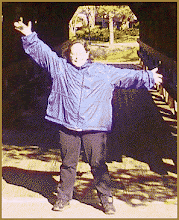Twenty-one years ago today an earthquake that measured 8.1 on the Richter scale shook Mexico City and other parts of the country, causing immeasurable damage. The following morning, an aftershock measuring 7.6 furthered the destruction. Official figures put the number of dead at "only" about ten thousand, but we will probably never know how many really died -- maybe three times that many?
(For more information read a brief Wikipedia article about the quake. See photos of the destruction at the National Geophysical Data Center site.)
I was living here in Mexico City when it happened, and although the whole thing was scary, I got off pretty easily. I was without power for about a week and without phone service for quite a bit longer, but I didn't personally know anyone who died, nor did I directly witness any dramatic events or consequences. Only one building in my neighborhood was seriously damaged -- and it wasn't mine. I think my parents --in the U.S.A. -- had it worse than I did, wondering if I were all right. After all, the news reports in the United States talked about how "the city had been destroyed," which was an exaggeration.
However, I do remember the event every year on September 19th ... which not everyone does. Those who experienced the earthquake say, "Oh, yeah, it's the anniversary ..." when I mention it. We then briefly exchange stories of where we were when it happened, and then the subject gets changed to something else. I'd say it has become a pretty dim memory for many, if not most, people.
But a lot of folks that I come in daily contact with do not remember the event. The vast majority of my students were either infants at the time or had not even been born yet. The '85 quake is not even a dim memory for them; it's ancient history. That is so weird. Why, everybody knows that for ancient history you have to go back at least to the 1950's! (I was born in 1964.)
Thousands died in this disaster (many of whose bodies were never recovered) and many thousands more were injured and left homeless. While not as dramatic in many ways as Sept. 11, 2001 was for New York, the earthquake left behind a somewhat similar feeling in that it marked a Before and After for Mexico City. Economic and political crises had become frequent in the years leading up to 1985, but it wasn't until the quake, El Temblor del '85, that a lot of people realized that the sunny 70's -- in many ways a heydey for this corner of the world -- were over.
Twenty-one years later, there are still people living in the "temporary" camps set up for those who lost their homes. Not all the collapsed buildings have had their ruins towed away yet, either, though parks and other lovely spaces have sprung up on some destruction sites. You'd think these daily reminders would keep the public saddened when they think about the disaster. I'm sure many people are bitter and have a right to be; however, among the folks of my acquaintance the things most remembered about the quake -- or at least the ones most reminisced about -- are the hopeful aspects of it all:
-- The amazing discovery and rescue, days and even a week after the earthquake, of several newborn babies who survived in the maternity ward of the completely destroyed Hospital Juárez. (Those kids turned 21 in the last day or two.)
--The sight of Spanish opera tenor Placido Domingo staying on for days to search for survivors in the populous and hard-hit Tlatelolco neighborhood, where he had had relatives; his plea for help for the area brought out thousands of volunteers.
--The way friends and neighbors and strangers came together in solidarity, if for only a brief time, until the emergency had passed.
--The outpouring of practical assistance from nations all over the world, despite the authorities' initial statements that "the Mexican government has everything necessary to face this disaster."
I think we humans hope instinctively. I think there is a "hope device" somewhere in our spirit that, unless somehow completely and tragically destroyed, continues to pump out a hormone-like stream of impulses into our lives until the day we die. So strong is this tendency that we even project hope onto the past, remembering the good things more than the bad.
It's quite amazing, actually, when you think about it.
Subscribe to:
Post Comments (Atom)




No comments:
Post a Comment